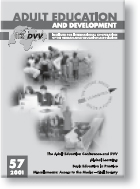DVV
The Role of the Volkshochschulen in the New Policy of Integration
Resolution of the General Meeting
- Fortunately, there is growing acceptance in Ger many of an active immigration policy. This process must be accompanied by an active policy of inte gration. Efforts at integration must include those foreign citizens and resettled ethnic Germans who have already been living in Germany for many years (immigration from within).
- As political decision-makers and society in general become more willing to integrate foreign citizens and resettled ethnic Germans into the fabric of the Federal Republic as part of an active immigration policy, the Volkshochschulen – continuing education institutions with public responsibility – will play a more active role in this integration process. They are well placed to do so, having the requisite experience and skills, on which they intend to build in the future.
- Integration is a multi-faceted, long-term and public task for society. If it is to succeed, efforts will have to be made by Federal, Land and local government, and by all forces in society. These efforts will need to include
- provision for the learning of German while retaining multilingualism,
- vocational continuing education and training for integration into the employment system, in close cooperation with the actors in the labour market,
- provision which serves cultural and social integration, while recognising and preserving immigrants’ identities,
- integrated models of provision combining language learning with vocational continuing education and/or political, social and cultural education.
- The stable integration of incoming groups into society necessarily takes place in cities, towns and villages. It can therefore only be successful if we make use of established networks for cooperation and experience of integration at local level, where the Volkshochschulen are responsible for the continuing education element of regular provision. They have excellent local and regional links with social, cultural and administrative institutions.
- The professional continuing education services provided by the Volkshoch schulen are regarded as outstanding by both foreign citizens and resettled ethnic Germans, who have great faith in these institutions. The Volkshochschu len as a whole are not only the largest provider of language courses in Ger many but also recognised organizers of intercultural and international round tables and discussion groups. One of the features of the Volkshochschulen is that they provide consistent and continual training for their course tutors, and guarantee the necessary standards of quality.
- However, the Volkshochschulen can only respond adequately to the heavy demand for provision for linguistic, vocational and social integration if they re ceive sufficient public support. A new policy of integration therefore demands a fundamental reform of funding and conditions of operation, so that these take into account the requirements of such a policy. This means that agree ment needs to be reached between Federal, Land and local government. In this context, the Volkshochschulen also call for German language courses for immigrants, as a Federal responsibility, to be organized, designed and funded so that they are likely to lead to successful learning and integration.
Berlin, 11. 6. 2001
Source: Adult Education and Development, Number 57, 2001, pp. 37 –38



